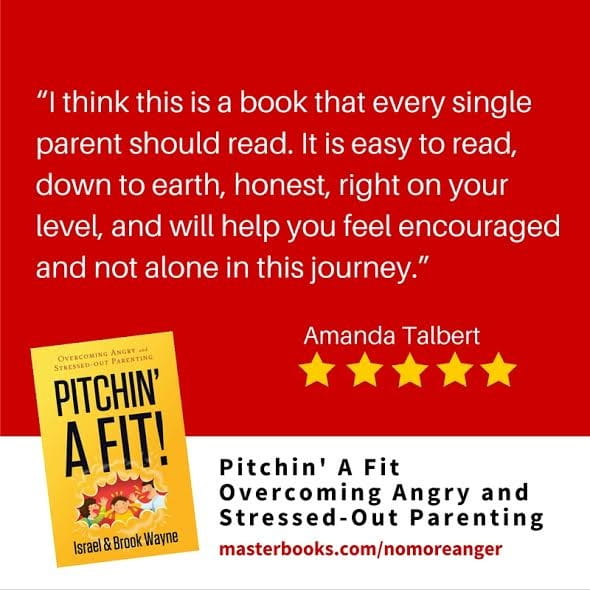
“Who left the garden tools in the rain last night?”
“Oh, I forgot!”
“You forgot?! I reminded you just after dinner last night. So how could you have forgotten?!”
“I don’t know.”
Suddenly, James 1:19 comes flooding back to mind. Be slow to speak. Be quick to listen. Be slow to get angry. It’s so counter-intuitive, but this is what God prescribes for us as parents.
Here are some lessons we’ve learned to help us ensure that we aren’t sowing seeds of anger, but seeds of patience into the lives of our children.
1. Simmer Down and Cool Off
When faced with a conflict or confrontation with your child, there is no need to be hasty. Time is on your side. Have a seat. Take some deep breaths. Maybe go to another room to collect your thoughts. Take a walk if you need to.
Don’t engage the child in discussion until you are certain that you have control of your emotions, rather than them having you in their clutches.
2. Limit Your Words
Some of us could put university professors to shame: we’re that good at delivering magnificent, well-versed lectures. Yet, for some reason, our children rarely appreciate our epic speeches, and even turn a deaf ear to them. Angry sermonettes don’t truly help parents reach the hearts of their children. In fact, most of the time, parental lectures only benefit the parent as he or she can let off some steam (similar to the emotional release yelling can have for a parent, but by which the child isn’t helped.)
Just as a yelling parent isn’t likely to win a listening ear, the lengthy, wordy parent is setting up a scenario for his or her child to shut down. It is important that parents heed the wisdom presented in Proverbs 17:27 (ESV): “Whoever restrains his words has knowledge, and he who has a cool spirit is a man of understanding.”
3. Teach with a Cookie in Hand
Correcting children after a calamity is not always the best way to teach. While certainly necessary, a better approach is to be preemptive and to teach the right way before a problem starts.
When the sun is shining, and all is right with the world, grab some chocolate chip cookies and teach your child about the dangers of foolish choices and the rewards of right living. Teach them, when all is cozy and comfortable, what the Bible says about lying and honesty. Share pizza with your teenager and talk sincerely about struggles you faced at their age, and how you began your relationship with Christ.
Taking the time to teach, talk, and train in a pro-active way means we need to keep our eyes alert for opportune moments. That’s really hard to do in the midst of a busy life! But if we don’t do it now, during perhaps the busiest season of our lives, when will we?
4. Cast a Vision
As we talk with our children, and walk them through seeing where disobedient choices brought them, it is also important to help them see what they could have done right. Talk about how your child can tell himself “no” when the sandbox calls and you’ve told him to put his bike away. Or how playing with dollies just a few more minutes after you’ve called for toy pick up, is still delaying obedience. Walking them through, in a fun and fast way, how to heed your words right away, will go a long way toward helping little ones catch on to what you are seeking to instill in them.
5. Draw Close
Anger tends to stand on the opposite side of the room from the offending child. Anger, reared in pride, naturally wants to “get away” from “that child” who has embarrassed, angered, or hurt you. And so, many times, angry parents stand across the room, sending their child a message of disdain.
When we have to correct our children, we often put an arm around them. This reminds both of us that this is not about a relational separation. Not every child will receive a loving touch, so it may work better with some than others.
Similarly, correcting conversations with our children need to be laced with words that create in our children a desire for genuine repentance, right living, and victory over the sin that has beset them. Let your child know that you are for him.
Patience, in the way we treat our children, is a powerful force that mirrors God’s attitude in Romans 5:8 (ESV): “But God shows his love for us in that while we were still sinners, Christ died for us” (see also Romans 5:6).
6. Use Scripture!
We cut ourselves short when we don’t avail ourselves of the mighty Word of God. Second Timothy 3:16 (ESV) reminds us, “All Scripture is breathed out by God and profitable for teaching, for reproof, for correction, and for training in righteousness.” Also, “For the word of God is living and active, sharper than any two-edged sword, piercing to the division of soul and of spirit, of joints and of marrow, and discerning the thoughts and intentions of the heart” (Hebrews 4:12, ESV).
The Scripture goes where we as parents can’t seem to reach: “So shall my word be that goes out from my mouth; it shall not return to me empty, but it shall accomplish that which I purpose, and shall succeed in the thing for which I sent it” (Isaiah 55:11, ESV).
We’re not much for slapping a Bible verse on every childish action, good or bad, but when addressing core issues of the heart, there is nothing like Scripture to communicate the deep truths of God. Don’t neglect to bring the Scriptures to light in your conversations with your children.
7. Remember to Pray with and for Your Child
Not every conversation you encounter with your children needs to end in prayer, and not every child will be ready to pray immediately. However, in the busyness of life, don’t neglect the power of praying with your child. As I recently needed to call a young person’s heart away from bad habits, I was impressed again with the need for the Holy Spirit to come do the work in my child’s heart that I can’t seem to pull off. These precious words came back to me from a song I had learned as a child: “Not by might, nor by power, but by my Spirit, says the Lord of hosts” (Zechariah. 4:6b, ESV).
Angry and stressed-out parenting is seeking to build our children using our own might and our own power. We feel like we’re “pulling teeth” as we try to drag our youngsters along to conform to “correct” outward behavior. Our might, our angst and rage, our yelling and lecturing, won’t capture the hearts of our children. It is God alone, by the power and might of His Holy Spirit that our children’s hearts will be won over to the Kingdom of God. Ours is a clear path of obedience to partner with Him as He does this work.
Related Video:
iBelieve.com: How can I explain the topic of sin to an elementary-aged child? - Jessica Thompson from ibelievedotcom on GodTube.
Israel and Brook Wayne are co-authors of the new book, “Pitchin’ A Fit: Overcoming Angry & Stressed-Out Parenting,”co-founders of Family Renewal, and the parents of nine children.








